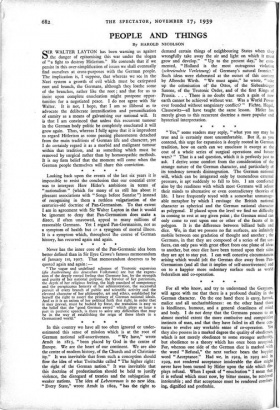" Yes," some readers may reply, " what you say
may be true and is certainly most uncomfortable. But if, as you contend, this urge for expansiot is deeply rooted in German tradition, how on earth can we enucleate it except at the cost of a whole series of surgical operations and future wars? " That is a sad question, which it is perfectly just to ask. I derive some comfort from the consideration of the strange nature of the German character, and particularly of its tendency towards disintegration. The German national will, which can be integrated only by tremendous external pressure, is apt suddenly to fall to bits. I am comforted also by the readiness with which most Germans will adjust their minds to alternative or even contradictory theories of life. I have frequently toyed with a somewhat unmanage- able metaphor by which I envisage the British national character as spherical and the German national character as polygonal. If placed upon the level we find no difficulty in coming to rest at any given point ; the German mind can only come to rest upon one or other of the facets of its polygon. It is the difference between billiard balls and dice. We, in that we possess no flat surfaces, are infinitely mobile between one gradation of thought and another ; the Germans, in that they are composed of a series of flat sur- faces, can only pass with great effort from one plane of ideas to another, but once dice have been turned upon their sides they are apt to stay put. I can well conceive circumstances arising which would jolt the German dice away from Pan- Germanism (and all that it implies of self-assertiveness) and on to a happier more sedentary surface such as world federalism and co-operation.




































































 Previous page
Previous page